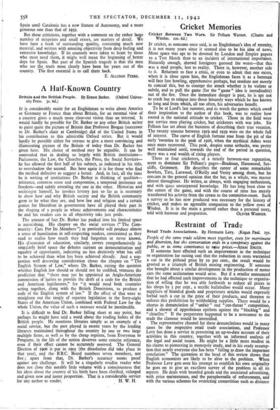Cricket Memories
Cricket Between Two Wars. Sir Pelham Warner. (Chatto and Windus. sos. 6d.) IF cricket, as someone once said, is an Englishman's idea of eternity, it is not many years since it seemed also to be his idea of news.
More space was apt to be devoted by London and Empire papers to a Test Match than to an incident of international importance. Naturally enough, shrewd foreigners guessed the worst—that this was a mad people, lost to reality. There is, however, another side to it. Reluctant to face a crisis, or even to admit that one exists, when it is close upon him, the Englishman faces it as a batsman will face fast bowling, apprehensive perhaps, but resolute not merely to conceal this, but to count,er the attack whether it be violent or subtle, and to pull the game (for the "game" idea is ineradicable) out of the fire. Once the immediate danger is past, he is apt not to crack but to relapse into those leisurely ways which he has known so long and from which, all too often, his adversaries benefit.
To be at Lord's last summer, and to watch the games which owed their inspiration to the author of this book, was to realise how rooted is the national attitude to cricket. Those in the field were not service men playing cricket, but cricketers with war jobs. Sir Pelham has set about the business of describing their true vocation. The twenty seasons between 1919 and 1939 were on the whole full of interest. The curve of English fortune rose from the pit of the early 'twenties to the peak of 1926, when the mythical Ashes were once more recovered. This peak, despite some setbacks, was pretty well maintained until, towards the end of the period in question, there was a real wealth of rising players.
Three or four cricketers, of a strictly between-war reputation, seem to dominate Sir Pelham's pages—Bradman, Hammond, Sut- cliffe, Grimmett. He describes the career of some remarkable bowlers, Tate, Larwood, O'Reilly and Verity among them, but he concurs in the general opinion that the bat, as a whole, was master almost throughout. He writes, as always, with engaging enthusiasm, and with quite unsurpassed knowledge. He has long been close to the centre of the game, and with the course of time has merely transferred his activity from the crease to the committee-room. Such a survey as he has now produced was necessary for the history of cricket, and makes an agreeable companion to the yellow rows of Wisden. It is in the main a general rather than a personal story,
told with humour and proportion. OLIVER WARNEFt.


























 Previous page
Previous page